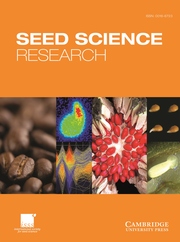Article contents
Heat-soluble proteins extracted from wheat embryos have tightly bound sugars and unusual hydration properties
Published online by Cambridge University Press: 19 September 2008
Abstract
Late embryogenesis abundant (LEA) proteins accumulate in developing seeds prior to maturation drying and are presumed to help protect embryos from desiccation stress. The unusual solubility properties of these proteins, such as resistance to heat coagulation, have led to suggestions that they alter the hydration properties of cellular constituents. Hydration characteristics and water potential range at which wheat heat-soluble LEA proteins were expressed have been determined. Levels of heatsoluble proteins decline in germinating seeds but can be induced by dehydration (ψ ≤ −0.5 MPa) in crown meristematic tissue that is desiccation tolerant. The heatsoluble extract from mature wheat embryos contained proteins and sugars at about a 1:1 (w/w) ratio. Only about half of the sugars could be removed by exhaustive dialysis; the rest appeared to be tightly associated with the proteins. The water sorption characteristics of undialysed and dialysed heat-soluble protein/sugar fractions were compared with other water-soluble proteins (bovine serum albumin, lysozyme or gluten) and with sucrose. At relative humidities greater than 50%, the amount of water absorbed by protein-sugar mixes was a function of the sugar content. For the same sugar content, the heat-soluble protein preparation absorbed 2–3 times more water than a lysozyme/sucrose preparation. The rate at which heat-soluble protein fractions dried was also different to desorption rates of lysozyme/sucrose mixes. While lysozyme/sucrose mixtures dried either very rapidly (within 20 min) or very slowly (about 2 months) depending on the sugar content, desorption rates of the heat soluble protein-sugar preparations were intermediate (2–10 days) and modulated by sugar concentration. Based on the presumption that the hydrophilic properties of LEA heat-soluble proteins are important to their function, it is suggested that these proteins function to control drying so that cells stay at critical water potentials for the proper time. In this respect, the heat-soluble LEA proteins do not prevent desiccation, but serve as hydration buffers.
Keywords
- Type
- Biochemistry and Metabolism
- Information
- Copyright
- Copyright © Cambridge University Press 1997
References
- 33
- Cited by


